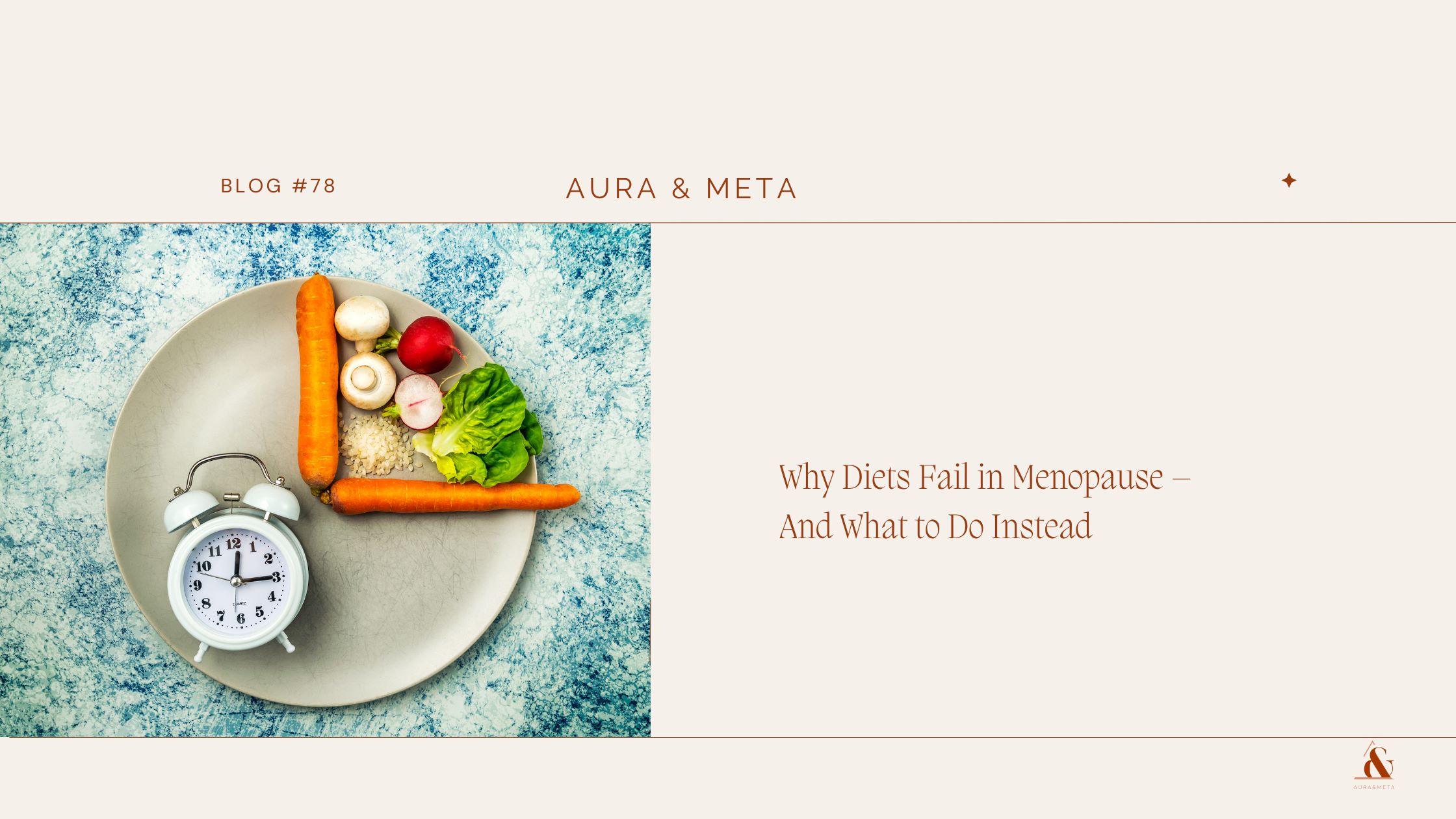Understanding Why Traditional Diets Don’t Work in Menopause
Menopause is a transformative phase in a woman’s life, impacting nearly every aspect of health, including metabolism, energy levels, and weight management. Many women struggle with weight gain during menopause and turn to traditional diets, only to find that they don’t yield the same results as they did in younger years. But why?
The truth is, most conventional diets fail during menopause because they don’t take into account the hormonal shifts that directly affect metabolism, appetite regulation, and fat storage. In this blog, we’ll explore why diets fail in menopause and what strategies actually work to support lasting weight management and overall well-being.
The Hormonal Connection to Weight Gain
During menopause, declining levels of oestrogen, progesterone, and testosterone disrupt the body’s natural ability to regulate weight. Some of the key hormonal factors at play include:
- Lower Oestrogen Levels & Increased Fat Storage
Oestrogen plays a vital role in metabolism and fat distribution. As oestrogen declines, the body tends to store fat in the abdomen rather than the hips and thighs, increasing the risk of visceral fat accumulation, which is linked to cardiovascular disease.
- Increased Cortisol Levels & Stress Eating
Menopausal women often experience elevated levels of cortisol, the stress hormone, which can lead to increased belly fat and emotional eating. Chronic stress also affects insulin sensitivity, making it harder to maintain stable blood sugar levels and curb cravings.
- Insulin Resistance & Blood Sugar Imbalances
Fluctuating insulin levels can lead to increased hunger and difficulty processing carbohydrates efficiently. Many women become more insulin resistant during menopause, meaning their bodies are less effective at using glucose for energy, leading to more fat storage.
- Slower Metabolism & Muscle Loss
Age-related muscle loss, combined with decreased testosterone levels, means that the body burns fewer calories at rest. Many women continue eating the same way they did in their 30s and 40s but find that they gain weight more easily.
Learn more about how functional testing can help identify hormone imbalances here.
Common Reasons Diets Fail in Menopause
- Restrictive Diets Increase Stress & Cortisol
Extreme calorie restriction puts the body under stress, leading to increased cortisol production. This not only makes weight loss harder but can also increase muscle breakdown and exacerbate fatigue.
- Low-Fat Diets Neglect Hormone Health
Healthy fats are essential for hormone production, brain function, and metabolism. Many traditional diets emphasize low-fat eating, which can actually worsen hormonal imbalances and reduce satiety, leading to increased cravings.
- Ignoring Protein Intake Leads to Muscle Loss
Adequate protein is crucial for maintaining muscle mass, especially during menopause. Many diets lack sufficient protein, which results in muscle breakdown, a slower metabolism, and increased fat storage.
- Focusing Solely on Calories, Not Nutrients
Traditional dieting often prioritizes calorie counting over nutrient density, ignoring the fact that nutrients like magnesium, omega-3 fatty acids, and fibre play a critical role in balancing hormones and reducing inflammation.
Explore nutritional therapy solutions for menopause support here.
What Actually Works? A Smarter Approach to Menopause Weight Management
Instead of following restrictive diets that don’t account for hormonal changes, consider a more sustainable and science-backed approach:
- Focus on Blood Sugar Balance
- Prioritize protein, healthy fats, and fibre at every meal.
- Reduce refined carbs and sugar to prevent insulin spikes.
- Incorporate fermented foods and probiotics for gut health.
- Support Metabolism with Strength Training
- Incorporate resistance training to maintain muscle mass.
- Engage in daily movement, such as walking or Pilates, to improve insulin sensitivity.
- Avoid excessive cardio, which can increase cortisol levels.
- Manage Stress & Sleep
- Prioritize 7-9 hours of quality sleep to regulate appetite hormones.
- Reduce stress with mindfulness practices like meditation, breathwork, and kinesiology.
- Limit caffeine and alcohol intake to support adrenal function.
Find out how kinesiology can support hormone balance.
- Optimize Gut Health for Better Nutrient Absorption
- Include prebiotic and probiotic-rich foods to support digestion and hormone metabolism.
- Consume fibre-rich foods to feed beneficial gut bacteria and promote satiety.
- Consider Functional Testing for Personalised Support
- The DUTCH Test provides insights into cortisol patterns, sex hormone levels, and metabolism.
- Genetic testing can help identify predispositions to insulin resistance and inflammation.
- Nutritional therapy can tailor dietary recommendations based on individual hormone imbalances.
Learn more about functional testing for hormone balance here.
Ditch the Diet, Focus on Balance
Traditional diets often fail menopausal women because they don’t address the root causes of weight gain—hormonal imbalances, stress, and inflammation. Instead of restrictive eating, focus on nourishment, balance, and lifestyle shifts that support long-term health.
Ready to optimize your health during menopause?
Book a Free Discovery Call to create a personalized nutrition and lifestyle plan tailored to your needs!

